Java Iterate Map
Iterate Map is extracting a bunch of data from the Map collection. In most real-time cases, we have much data stored on a map. The developer wants to fetch this data; he has to iterate the entire map. A map is stored in util.Map package. In this topic, we are going to learn about Java Iterate Map.
Start Your Free Software Development Course
Web development, programming languages, Software testing & others
You can iterate over a map in 3 ways.
- forEach
- Normal for loop
- While looping with an iterator
What is a Map?
1. Map is a key and value pair structured collection. The map is an interface. So, Map implemented into
- HashMap
- LinkedHashMap
- TreeMap
2. Entry is the sub interface of Map. Therefore, it will be accessible by the Entry name. It returned the collection view of the map. Map. The entry provides methods to fetch key and value pair.
Important Methods
- put(Object keyValue, Object objectValue): It inserts some value into a map.
- keySet(): It is used for getting a key pair set.
- entrySet(): It is used to set keys and values to the map.
- size(): It is used for getting map size.
- getKey(): It is used for getting a key value.
- getValue(): It is used for getting a key-mapped value.
How Does Iteration Work in Map?
As discussed above, Map can be iterated with forEach, normal for, and while loop. We will understand it by Syntax.
1. forEach
Syntax:
Map<DataType, DataType>map = new HashMap<DataType, DataType>(); map.forEach((key, value) -> //logic
2. for with entrySet()
Syntax:
Map<DataType,DataType> map= new HashMap<DataType,DataType>(); for (Map.Entry<DataType,DataType> set: map.entrySet()) //logic }
3. While loop with an iterator
Syntax:
Map<String, String> mapObj = new HashMap<>();
Iterator iterator= mapObj .entrySet().iterator();
while (iterator.hasNext()) {
//logic
}Based on the requirement, we can iterate the map in any of the above ways.
Examples of Java Iterate Map
Given below are the examples:
1. Map iteration with forEach Example
Code:
import java.util.HashMap;
import java.util.Map;
public class ForEachMapIteration {
public static void main(String[] args) {
// creating a hashmap object
Map<Integer, String> names = new HashMap<>();
// adding key and values to hash map
names.put(1, "Paramesh");
names.put(2, "Amardeep");
names.put(3, "Venkatesh");
names.put(4, "Ramesh");
names.put(5, "Suresh");
names.put(3, "Krishna");
names.put(4, "Rama");
names.put(5, "Rajitha");
// iterating key and value with forEach loop
names.forEach((key, value) -> {
System.out.println("ID =>" + key + " Name => " + value);
});
}
}Output:
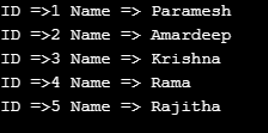
Explanation:
As you can see in the above code, we have iterated the map with forEach
2. Map key and value iteration separately with forEach loop Example
Code:
package com.map;
import java.util.HashMap;
import java.util.Map;
public class ForEachKeyValueMapIteration {
public static void main(String[] args) {
// creating a hashmap object
Map<Integer, String> names = new HashMap<>();
// adding key and values to hash map
names.put(1, "Paramesh");
names.put(2, "Amardeep");
names.put(3, "Venkatesh");
names.put(4, "Ramesh");
names.put(5, "Suresh");
names.put(3, "Krishna");
names.put(4, "Rama");
names.put(5, "Rajitha");
// iterating ids with forEach loop
names.forEach((key, value) -> {
System.out.println("ID =>" + key);
});
// iterating names with forEach loop
names.forEach((key, value) -> {
System.out.println("Name => " + value);
});
}
}Output:
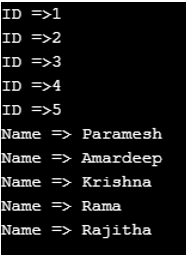
Explanation:
As you can see in the above output, we can also fetch the key and values separately with the forEach loop.
3. Map Iteration with for loop Example
Code:
<strong> </strong>import java.util.HashMap;
import java.util.Map;
import java.util.Map.Entry;
public class ForMapIteration {
public static void main(String[] args) {
// creating a hashmap object
Map<Integer, String> names = new HashMap<>();
// adding key and values to hash map
names.put(1, "Paramesh");
names.put(2, "Amardeep");
names.put(3, "Venkatesh");
names.put(4, "Ramesh");
names.put(5, "Suresh");
names.put(3, "Krishna");
names.put(4, "Rama");
names.put(5, "Rajitha");
// iterating key and value with for loop
for (Entry<Integer, String> entry : names.entrySet())
System.out.println("ID => " + entry.getKey() + " Name => " + entry.getValue());
}
}Output:
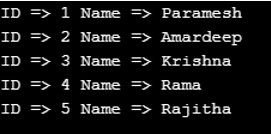
Explanation:
As you can see in the above code, we have iterated the map with for loop.
4. Map key and value iteration separately with for loop Example
Code:
<strong> </strong>import java.util.HashMap;
import java.util.Map;
public class ForKeyAndValueMapIteration {
public static void main(String[] args) {
// creating a hashmap object
Map<Integer, String> names = new HashMap<>();
// adding key and values to hash map
names.put(1, "Paramesh");
names.put(2, "Amardeep");
names.put(3, "Venkatesh");
names.put(4, "Ramesh");
names.put(5, "Suresh");
names.put(3, "Krishna");
names.put(4, "Rama");
names.put(5, "Rajitha");
//fetching ids
for (Integer id : names.keySet())
System.out.println("ID => " + id);
// fetching names
for (String name : names.values())
System.out.println("Name => " + name);
}
}Output:
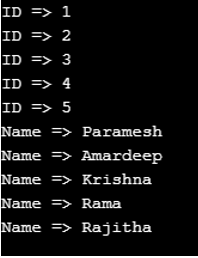
Explanation:
As you can see in the above output, we can also fetch the key and values separately with for loop.
5. Map Iteration with while loop and iterator Example
Code:
import java.util.HashMap;
import java.util.Iterator;
import java.util.Map;
import java.util.Set;
public class WhileIteratorLoopMap {
public static void main(String[] args) {
// creating a hashmap object
Map<Integer, String> names = new HashMap<>();
// adding key and values to hash map
names.put(1, "Paramesh");
names.put(2, "Amardeep");
names.put(3, "Venkatesh");
names.put(4, "Ramesh");
names.put(5, "Suresh");
names.put(3, "Krishna");
names.put(4, "Rama");
names.put(5, "Rajitha");
//get entry set from map
Set set = names.entrySet();
//get iterator from set
Iterator iterator = set.iterator();
//fetching id and names with while loop
while (iterator.hasNext()) {
Map.Entry entry = (Map.Entry) iterator.next();
System.out.println("ID =>"+entry.getKey() + " Name => " + entry.getValue());
}
}
}Output:
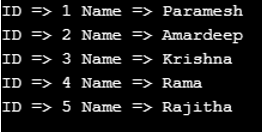
Explanation:
As you can see in the above code, we have iterated the map with an iterator and while loop.
Note: All the cases produce the same output, but the forEach loop is recommended for development because it has less run time.Conclusion – Java Iterate Map
You can iterate over the map using the for loop, forEach loop, and while loop from the Entry interface. We can also iterate keys and values separately without any errors.
The above is the detailed content of Java Iterate Map. For more information, please follow other related articles on the PHP Chinese website!

Hot AI Tools

Undresser.AI Undress
AI-powered app for creating realistic nude photos

AI Clothes Remover
Online AI tool for removing clothes from photos.

Undress AI Tool
Undress images for free

Clothoff.io
AI clothes remover

AI Hentai Generator
Generate AI Hentai for free.

Hot Article

Hot Tools

Notepad++7.3.1
Easy-to-use and free code editor

SublimeText3 Chinese version
Chinese version, very easy to use

Zend Studio 13.0.1
Powerful PHP integrated development environment

Dreamweaver CS6
Visual web development tools

SublimeText3 Mac version
God-level code editing software (SublimeText3)

Hot Topics
 1382
1382
 52
52
 Perfect Number in Java
Aug 30, 2024 pm 04:28 PM
Perfect Number in Java
Aug 30, 2024 pm 04:28 PM
Guide to Perfect Number in Java. Here we discuss the Definition, How to check Perfect number in Java?, examples with code implementation.
 Weka in Java
Aug 30, 2024 pm 04:28 PM
Weka in Java
Aug 30, 2024 pm 04:28 PM
Guide to Weka in Java. Here we discuss the Introduction, how to use weka java, the type of platform, and advantages with examples.
 Smith Number in Java
Aug 30, 2024 pm 04:28 PM
Smith Number in Java
Aug 30, 2024 pm 04:28 PM
Guide to Smith Number in Java. Here we discuss the Definition, How to check smith number in Java? example with code implementation.
 Java Spring Interview Questions
Aug 30, 2024 pm 04:29 PM
Java Spring Interview Questions
Aug 30, 2024 pm 04:29 PM
In this article, we have kept the most asked Java Spring Interview Questions with their detailed answers. So that you can crack the interview.
 Break or return from Java 8 stream forEach?
Feb 07, 2025 pm 12:09 PM
Break or return from Java 8 stream forEach?
Feb 07, 2025 pm 12:09 PM
Java 8 introduces the Stream API, providing a powerful and expressive way to process data collections. However, a common question when using Stream is: How to break or return from a forEach operation? Traditional loops allow for early interruption or return, but Stream's forEach method does not directly support this method. This article will explain the reasons and explore alternative methods for implementing premature termination in Stream processing systems. Further reading: Java Stream API improvements Understand Stream forEach The forEach method is a terminal operation that performs one operation on each element in the Stream. Its design intention is
 TimeStamp to Date in Java
Aug 30, 2024 pm 04:28 PM
TimeStamp to Date in Java
Aug 30, 2024 pm 04:28 PM
Guide to TimeStamp to Date in Java. Here we also discuss the introduction and how to convert timestamp to date in java along with examples.
 Java Program to Find the Volume of Capsule
Feb 07, 2025 am 11:37 AM
Java Program to Find the Volume of Capsule
Feb 07, 2025 am 11:37 AM
Capsules are three-dimensional geometric figures, composed of a cylinder and a hemisphere at both ends. The volume of the capsule can be calculated by adding the volume of the cylinder and the volume of the hemisphere at both ends. This tutorial will discuss how to calculate the volume of a given capsule in Java using different methods. Capsule volume formula The formula for capsule volume is as follows: Capsule volume = Cylindrical volume Volume Two hemisphere volume in, r: The radius of the hemisphere. h: The height of the cylinder (excluding the hemisphere). Example 1 enter Radius = 5 units Height = 10 units Output Volume = 1570.8 cubic units explain Calculate volume using formula: Volume = π × r2 × h (4
 How to Run Your First Spring Boot Application in Spring Tool Suite?
Feb 07, 2025 pm 12:11 PM
How to Run Your First Spring Boot Application in Spring Tool Suite?
Feb 07, 2025 pm 12:11 PM
Spring Boot simplifies the creation of robust, scalable, and production-ready Java applications, revolutionizing Java development. Its "convention over configuration" approach, inherent to the Spring ecosystem, minimizes manual setup, allo





